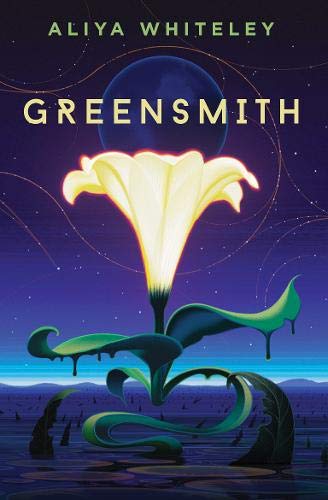Hort is described in many ways by these voices, but I can always tell that they are talking about him. Him to me, she or it or they to others, and sometimes there are long pauses as the limitations of language are reached. Hort has been a lover, a murderer, an adventurer, a cataclysm, a God. But to him we have all been the trusty companion.

It wasn’t until I was almost three-quarters of the way through Aliya Whiteley’s new novel Greensmith (published by Unsung Stories on October 12th) that I realised I was reading an extended critique of Doctor Who. Not the show itself – no debating Classic versus New, no wrangling over who is or was the best Doctor here – so much as its moral universe. The lonely alien in the blue box, the scintillating, hyperactive superbeing whose sole mission, or so it seems in the stories, is to keep us – us personally – safe from harm. It is a seductive vision. The number of Who episodes that feature a lonely, chosen child, waiting by their bedroom window staring up at the stars, awaiting the return of the hero only they know exists – we have all been that child at some point, if only at five o’clock on a Saturday evening (apologies to younger viewers but that is still Doctor Who time for me).
What we learn through our time with the show is that all these hopeful children, sooner or later, will be discarded. The moment of parting is always searingly painful – watch any of those episodes again now and inevitably I’ll find myself in tears – and yet we conspire to forget. To believe that next time, for the next companion – for us – the outcome will be different, that we will be the One.
The wonder of myths is in their longevity, their ability to transcend time and place, to become as personal as they are universal. That mythologies can also be harmful – mendacious – is a truth we do not care to examine as deeply as we ought.
Of course, Greensmith is so much more than an extended essay on one particularly popular British TV show, though the plot synopsis does a pretty good impression of a Moffat story from Mat-Smith-era Who. Penelope Greensmith is fifty-three years old. She is a botanist and librarian. More importantly she is the keeper of the Collection, a ‘bank’ of every plant species on Earth, assembled by Penelope’s father with the help of a mysterious invention called the Vice.
When a deadly virus begins decimating all plant life on Earth, Penelope is taken under the wing of a being who calls himself the Horticulturalist, and who claims that together they can discover a way to fight the virus and save the planet. Reduced to a two-dimensional slip of information, Penelope is whirled away into time and space, embarking on a series of ever more fantastical adventures. The further she journeys, the more she begins to suspect that Hort is hiding the essential truth about his identity and his mission.
More so than with any other form of literature, science fiction tends to encourage discussion of what it does and what it is for. Fans talk enthusiastically of newness, of SF’s potential for the exploration of complex ideas, All too often, such potential is disregarded in favour of familiarity. Through the media of games, TV shows and movies as well as books, science fiction is more popular now than it has ever been. We are undoubtedly living through a new golden age of science fiction, with the uncertainty of the present moment providing a mirror to the multitude of fictional universes there are to choose from. Popularity always has a down-side, however, and the demands of an increasing fanbase have in many cases stymied the genre’s progress as a literary form. Readers say they want bold ideas, yet in reality what they prefer are ideas that are brightly coloured and easily digestible.
When science fiction is truly bold, truly ground-breaking, its very boldness can make it puzzling and harder to parse. Ideas that are truly complex take longer to absorb. I would argue that anyone who reads Greensmith and doesn’t find themselves wondering on at least one occasion what the hell they are reading, isn’t reading hard enough.
Greensmith is a backwards hero’s journey that questions the very concept of the hero. It is a novel with a middle-aged woman as its protagonist that actually talks about middle age, about the menopause, about the difficulty of forming relationships when one is fiercely attached to one’s independence. Greensmith is about family ties, loyalty that transcends logic, the love of one’s planet. Most of all it is a book about plants: plants glorious and multitudinous and various, plants that stir the imagination and stimulate the senses, plants that are beings sharing our world as opposed to material to be used by humans as food and shelter.
Greensmith is a novel that is not afraid to talk, at length, about complex ideas. The adventure portion of the novel – the first half – is in a sense simply the set-up for a philosophical argument about existence, eternity and the inherent moral danger in assuming one’s own interpretation of history to be superior to another. It is a novel that refuses to give us the happy ending we humanly yearn for – yet it does deliver another concept of rightness, one it takes time to come to terms with but that is ultimately more satisfying and more durable.
I have heard Greensmith described as a comedy. This judgement may say more about my seemingly irrepressible tendency to cry at Doctor Who than it does about the novel, but I found it to be one of the most poignant, elegiac and spiritual works of science fiction I have read all year.
Aliya Whiteley is a writer of rare originality and inventiveness. Her instinct for new ways of looking at things, her seemingly inexhaustible capacity for intelligent observation, her passion for asking questions and for ideas make her one of the most important writers of speculative fiction working today. That her books are quiet and often uncategorisable, that they require sitting with and thinking about, that they deny easy solutions and trite explanation – these qualities are what make them true to the spirit of science fiction, that will ensure their longevity. What Greensmith means to me will be different from what it means to you – and therein lies its glory.
*
With ten episodes of Corona Crime Spree and sixteen Weird Wednesdays, this post marks exactly six months of weekly blogging – half a year’s worth of essays. It also happens to mark the week in which I completed a working draft of my novel-in-progress. The final chapter was written on the Isle of Mull, where an earlier version of the text was originally set. This gave me the weird sensation of inhabiting a ghost-version of the novel, almost as if the space I was occupying belonged to other characters.

Completing a version of the book as it now is came as something of a relief, though I won’t really know what I’ve ended up with until I begin work on the second draft, in a few weeks’ time.
At the beginning of lockdown, it seemed important and helpful to post what became in effect weekly dispatches from my desk, charting the progress of my reading and thinking through this strangest of years. It still does feel important and helpful, and although I have decided to be more flexible with my schedule – this will be the last Weird Wednesday in this particular sequence – I intend to keep posting regularly through the autumn and winter.
I hope you’re all doing well meantime.